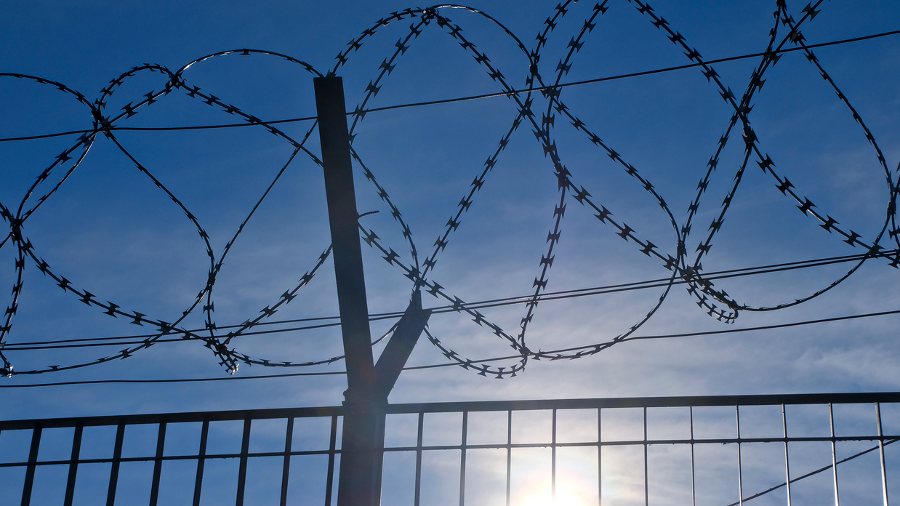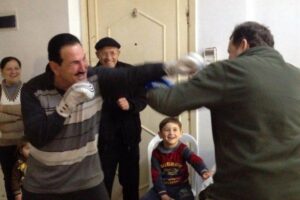Never Put a Scorpion in Your Pocket

Last week, the President of El Salvador, Nayib Bukele, gave a speech at CPAC. Much of what this young and dynamic leader had to say about our global, political climate is well worth hearing. The most important point of his speech, however, was made within the first three minutes when he warned the audience about criminals and organized drug cartels, some of whom even practice satanism, entering the United States across the Southern Border: “[There are] dark forces already taking over your country,” Bukele warned. “You may not see it yet, but it is already happening. You don’t see it as clearly because people are designed to see linear changes, not exponential ones. We don’t always recognize how fast a problem can multiply and spiral out of control.”
Close the Border
Bukele is exactly right, and we, the citizens and owners of this country, should demand, loudly and persistently, that the Southern Border be closed immediately and completely and be kept that way until we can sort out who is entering our country and why they are here.
Why take such drastic action? First, as President Nayib Bukele pointed out, people tend not to understand or even see rapid change. Like the metaphor of the frog in a pot of water, we, too, are not equipped to see dangers that grow by leaps and bounds, and by the time the water is boiling, it is too late to save ourselves. We read stories of criminal immigrants assaulting police officers in Times Square or a murdered nursing student in Georgia, and it is hard for us to see a connection between them. But these stories (and so many others) are connected: If we let criminals into our country, they tend to commit crimes.
There are other blind spots, notably three, we Americans have that keep us from seeing the dangers that an open, unregulated border poses to all of us.
Communication Networks Among Criminals
First, most Americans don’t know how connected the world is. Immigrants, both those genuinely wanting to follow the rules and become U.S. citizens, as well as the bad actors, are connected globally through real-time, encrypted apps (such as WhatsApp and Telegram) that allow them to communicate, in secret, all the way up and down pathways of entry into the United States. Like a giant millipede, the head, those immigrants who have managed to get into the country, communicate back to the tail, those wanting to get in, about everything from weak spots in the border to border guard schedules and even what to say, if caught, to become eligible for asylum status and taxpayer-funded housing, transportation, food and medical care.
Please Support The Stream: Equipping Christians to Think Clearly About the Political, Economic, and Moral Issues of Our Day.
Criminals and terrorists use these same lines of communication extensively, secretly, to gain entry into the United States and then coordinate everything from drug smuggling to organized theft to sex trafficking in and out of the country. As an illustration of how effective these communication networks are, I suggest everyone read Patrick Kinsley’s book, The New Odyssey: The Story of Europe’s Refugee Crisis. Kingsley is pro-immigration, and as a journalist, he took the daring step of embedding himself among the refugees coming out of Africa and the Middle East who were heading both to Europe and the United States. The sophistication with which determined migrants use untrackable communication tools will surprise most who read his book.
communication networks are, I suggest everyone read Patrick Kinsley’s book, The New Odyssey: The Story of Europe’s Refugee Crisis. Kingsley is pro-immigration, and as a journalist, he took the daring step of embedding himself among the refugees coming out of Africa and the Middle East who were heading both to Europe and the United States. The sophistication with which determined migrants use untrackable communication tools will surprise most who read his book.
Tough and Determined Refugees
Second, most Americans do not understand that the world’s refugee population is tough and determined. Americans often wonder, in uncomprehending awe, how it is that illegal immigrants from China, countries in Africa and the Middle East are frequently apprehended at the Southern Border. The answer is that the world’s poor are much tougher and more determined than most comfortable, suburbanite Americans can imagine. Millions of the world’s poor are more than willing to crowd into shipping containers that are then stacked hundreds deep, to cross the Pacific or Atlantic, ride on the tops of trains, sleep in open fields, eat little or nothing and drink from ditches for days to get into the U.S. While the trials of these unfortunate souls are heartbreaking, we must keep in mind that some of these determined travelers are either part of global criminal organizations or are pressed into the service of drug cartels and organized criminal gangs through promises of money or threats of violence.
Brutality and Savagery of Gangs and Terrorists
Third, and finally, most Americans cannot imagine the levels of brutality and savagery that are routine for the various gangs and terrorists of the world. Having spent years working in the Middle East and Central Africa, I have lost track of the number of victims I have spoken with who have been raped, shot, had parts of their bodies cut off, watched as their children were murdered or stolen from their arms and sold into sex slavery by terrorists or drug-dealing gangs.
The Poor Come to the U.S. Because Their Countries are Broken
The reason that the poor of the world are so willing to suffer to get into the United States is that their own countries have been overrun by forces so brutal, so savage that it strains the ability of most Americans to imagine. Those same evil forces see tremendous opportunity, by way of an open Southern Border, to bring their crime, drugs, sex trafficking and terrorism to the United States. These criminals hide seamlessly among the world’s poor, largely because their broken countries of origin have little to no functional systems of documentation. According to the Pew Research Center, the “vast majority” of immigrants arrive at the U.S. Southern Border without any documents, and it is nearly impossible to determine who is the migrant in need and who is the criminal. This, too, was the point that President Bukele was trying to drive home in his speech.
Azor’s Story
The imperative to close our Southern Border and get a grip on who is entering the country and why can be summed up in a conversation I once had with an Iraqi Christian who fled for his life from his country.
His name was Azor, and I met him while working in Amman, Jordan, in 2014.

(Azor the boxer. Amman, Jordan. Copyright © Jeff Gardner, 2014)
Azor was a boxer and once boxed on the Iraqi national team. Despite his advanced age, he said he still loved the sport. To make his point, he produced two sets of boxing gloves and insisted that I go a couple of mock rounds with him in the living room of the small apartment where he and his family stayed. Fortunately, he never allowed himself to lay a glove on me.

(Azor the boxer (pictured left) goes easy on the author, Jeff Gardner (pictured right). Amman, Jordan. Copyright © Jeff Gardner, 2014)
Azor told me how he once lived happily near the city of Mosul, Iraq, but had been forced to flee to the Kingdom of Jordan after the murder of a close friend.
Azor and his friend, who was Muslim, ran a weekend boxing clinic for the youth of their city. On one particular Friday, as they headed to the gym, Azor’s friend asked if they might stop at the local Mosque so he could attend to his Friday prayers. Azor agreed and, being Christian, waited in the car until his friend had finished, after which they continued to the gym.
Get The Stream’s daily news roundup, quick and served with a healthy splash of humor. Subscribe to The Brew
Early the next week, Azor received a phone call from a number he did not recognize. When he answered his cell phone, a cold and venomous voice told him that his boxing friend was dead, shot in the back of the head as punishment for bringing Azor, “a filthy Christian,” to the Mosque parking lot. The next bullet, the voice informed Azor matter-of-factly, was for him.
As he finished his story, his eyes brimming with tears over how he and millions of others had lost everything, their family members, their livelihoods and their country to illegal, invading terrorists, he paused and looked at me with a sense of bewilderment and asked: “Why do you Americans let these evil people come to your country? Why are you not making sure who they are and what they want?” “Have you not heard the saying,” he asked, “Never put a scorpion in your pocket?” Azor’s question answers itself, and as we should all realize, he was deadly right.
Dr. Jeff Gardner holds an MA in history and a Ph.D. in Communication and Media Studies. For over a decade, he has worked in media, writing and taking photographs for various publications and organizations across North America, Europe, Asia, Africa and the Middle East. His work has been featured in numerous national and international publications and broadcasts. He teaches courses in media, culture and government at Regent University. You can reach him at jeffgardner.online.







